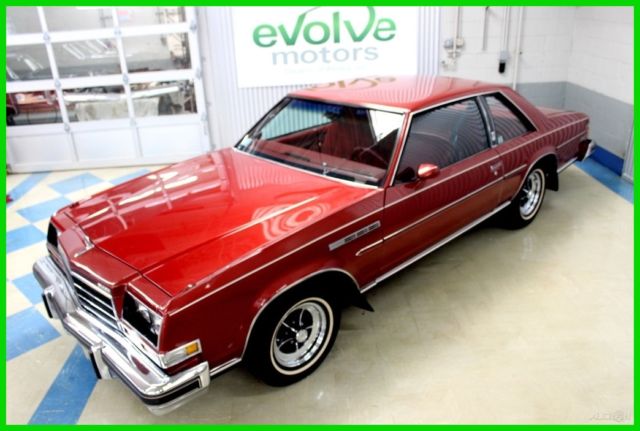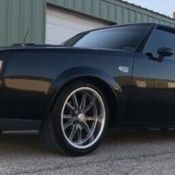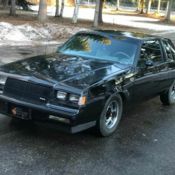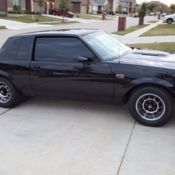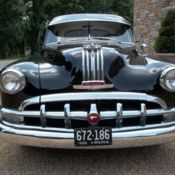SURVIVOR! Classic Collector Car Coupe Turbocharged Regal Grand National Muscle
1979 Buick LeSabre Priced to Sell!!
SCROLL DOWN TO SEE ALL HIGH RESOLUTION PICTURES
1979 Buick LeSabre
Sport Coupe
“Grand-Dad’s Grand National”
3.8L Turbo-Charged V6
3 Speed Automatic
ONLY 99,034 ORIGINAL
MILES!!
RARE
One Owner!!
-1 of Only 3,582 Built in 1979
True Survivor!
Vin # 4F3739H548238
4
(Division) = Buick
F
(Series) = LeSabre Custom
37
(Body Type) = 2 Door Coupe
3
(Engine Type) = 231ci (3.8L) V6, Turbo
9
(Model Year) = 1979
H
(Assembly Plant) = Flint, MI
548238
(Sequential Serial Number)
CALL TODAY 773-267-2684
WE SHIP WORLDWIDE!
PPI's WELCOME
OFFERS WELCOME!
Evolve Motors is pleased to present this wolf in sheep’s clothing. It’s part Regal. It’s part Grand National. It’s the 1979 Buick LeSabre Sport Coupe.
When many enthusiasts think about turbo Buick power, they picture a Grand National, in basic black, all crisply folded sheet metal, and threatening attitude. Certainly, in later years, the GN got the lion's share of the attention from enthusiasts; with as much power available from six boosted cylinders as eight naturally aspirated ones, the turbo 3.8 has gone on to surpass mere cult status in the performance world, becoming a force to be reckoned with in its own right. A red Le Sabre is not what immediately springs to mind.
But, once upon a time, the Buick 3.8L Turbo V-6 wasn't simply a kick-ass performance engine designed to boil the hides at the blip of a throttle and embarrass vehicles packing two more cylinders. It was a technologically complex answer to one of the most vexing problems of the OPEC-strangled Seventies: How do you achieve decent performance and good gas mileage, without radically altering the course of what an automobile should be?
Buick had actually produced the answer in the early Sixties: One development of Buick's all-aluminum 215-ci. V-8, which eventually was sold to Rover of England and is still produced in modified form there today, was a 198-cubic-inch, six-cylinder version with a cast-iron block. It was America's first mass-produced V-6. Its uneven firing order produced a rough idle, which certainly wasn't very Buick-like. In 1963, displacement increased to 225 cubic inches. But in the go-go Sixties, demand for the upscale marque's little V-6, much less one that didn't idle smoothly, simply wasn't there. In 1967, Buick sold the design to Jeep, who then stopped production once AMC took ownership in 1970. Buick bought the rights and tooling back from Jeep in 1974, when the first gas crisis hit and AMC was in one of its perpetual financial crises. Buick quickly furnished a 3.800-inch bore and a total displacement of 231 cubic inches, a displacement that remained unchanged through the Eighties; this was the same bore as Buick's own 350-cu.in. V-8, which allowed it to share pistons and other components and to be produced on the same assembly line. The odd firing order remained.
Buick, known more as a luxury-car division than one with sporting intentions, later stated that their goal was to produce V-8 power with V-6 economy; reviving the muscle car appeared to be the last thing they had on their minds. Proof of this comes in the automobile you see here: the Buick Le Sabre Turbo Sport Coupe. Today, the Le Sabre seems an unlikely candidate for turbocharged power, but that is exactly what Buick did in 1978. The Le Sabre had gone through an Al Roker-style downsizing the previous year, losing ten inches in length and 650+ pounds, and came standard with a 301-cu.in. Pontiac V-8 in 1977; the turbo-powered V-6 became the standard Sport Coupe engine in 1978. The Sport Coupe was mostly a trim package: emblems, black trim around the windows, grille and B-pillar and 15x7-inch road wheels. The Regal's telltale hood bulge was absent; the small V-6 could clear that broad expanse of Le Sabre hood just fine. A firmer suspension package featuring stiffer springs and shocks, front and rear anti-roll bars, and GR70-15 white-letter radials, plus quicker steering, were the only driveability improvements. Inside, just two little lights in the fuel gauge tell the driver when he's in boost. The first comes on at 3.5psi, the second comes in at around 6psi.
Cramming all of that extra air into an engine is bound to create detonation, and most turbochargers up to that point used some manner of water or alcohol injection to help suppress knock. However, in the late Seventies, electronic controls were just coming into their own, and Buick elected to go this route with their anti-knock efforts. Electronic Spark Control (ESC) incorporates the Turbo Control Center, which was a little black box located on the fan shroud, and a knock sensor in the engine itself (actually attached in the intake manifold on early models). Timing was automatically retarded when detonation was detected.
To see how this new technology worked, Road & Trackpitted a pair of Le Sabre Sport Coupes against each other in their February 1978 issue: One was the 4-barrel, turbo-equipped V-6; the other had a 4-barrel, 350-cu.in. V-8. Their findings were most remarkable: Up to 40 mph, the two were within a tenth of a second of each other; by 60, the turbo was a full second quicker, and 2.5 seconds quicker to 90 mph. They also noted that the Turbo model recorded a three mpg improvement over the V-8. This test is one of the only contemporary media mentions about the Turbo Le Sabre; most of the attention was paid to the smaller Regal, perhaps because it could extract more performance, perhaps because it was an all-new platform in 1978. The turbo engine seemed to be a sales hit for Buick, though according to published reports, just over 8,000 Turbo Le Sabre Sport Coupes were built.
For 1979, two more turbo models were added to the lineup: the oddly styled Century Coupe and the all-new front-drive Riviera. More than 27,000 turbo-powered Buicks of all stripes were sold that year; Le Sabre Turbo Sport Coupe production numbered exactly 3,582 units, according to the excellent Before Black website (http://home.flash.net/~rgeorge/). Most were sold with all of the power options one would expect to come with a Buick in 1979-windows, locks, seats, air conditioning, and ball washer. For the golfing fans, you see. This shining example is appointed perfectly.
We slid into the soft cloth buckets, twisted the key and took stock of our surroundings. Typical late Seventies American, lots of chrome and faux wood, save for the round silver-faced speedometer and fuel gauge with boost light that didn't look as out of place as it may sound. Bench seats and a column shifter in a full-size were usual concepts for 1979, and similarly, do not look out of place here. Twist the key. Idle is slightly lumpy, though whether it's the engine design itself or simply because it's cold is undetermined. The rest of the interior is in A1 condition. Seats show no signs of wear or tear, dash is free of cracks or fading, and the headliner is nice and tight. The red carpet floors are still showroom clean. After our initial assessment we had to question if the odometer was correct at 99,000 miles. Inward, this car looks as good as any 10,000 mile example we’ve seen!
As we climb out of the cockpit and make an assessment of the sheet metal, we are pleased with the overall quality of this Sport Coupe. It seems to be in all original panels, with quality gapping between the doors, hood, and trunk. We do note that a previous re-paint of the hood was done. Not a top quality job, I would give it a B-. Just north of the grill, we detected a pinky-sized ding in the steel grill surround. There has been some obvious fading of the black trim around the front and back windshield, as well as on both B-pillars. All of the chrome in the bumpers and trim is in good order, and free of rust or dings. We do note however, behind the bumpers, the all too common plastic “filler” pieces have seen some weathering, and have cracked on a few of the corners (undetectable from a quick walk-around, unless you’re looking for them). Overall, the exterior of this car gets a solid B; Not an award winning museum piece, but far from a bucket of bolts. This car will be the talk of the local shows, once people actually realize what they’re looking at!
As we climbed back into the driver seat, turned the key, and pointed this LeSabre toward the nearest open highway, we weren’t sure what to expect. Acceleration...well, do the numbers: 170 horsepower, six cylinders, a 3.23 axle ratio, and about 4,000 pounds plus driver to lug around won't wake up the neighbors. Get on it from idle and you crawl away from the traffic light; boost builds with exhaust pressure, so from a light, it's like you're launching a naturally aspirated V-6. Power-braking doesn't do much to help, and without a tach, you would have to live with it to sort out how high to crank the revs, aurally. In either instance, you don't accelerate so much as accumulate speed, and while it's easy to get the first bar lit up (3 1/2 pounds), getting the second bar (6 1/2 pounds of boost) takes a fair bit of full foot-to-the-floor hammering; the earliest we saw full boost was at 45 mph. Power is smooth and linear; the boost kicking doesn't slam you back in your seat. It's just as important to remember, however, that the V-8 models of the era were no better. We detected no spark knock during our drive, so the electronic controls were still functioning as prescribed, though at the same time it's impossible to know how much timing it was pulling back under full acceleration.
Ride quality featured none of the expected float that the vast majority of these possessed.
Handling was a little trickier; in the Sport Coupe's inherent desire to be smooth at all costs, it actually hinders its own plans. The chassis felt tight enough, thanks in part to the anti-roll bars, but the over-assisted power steering was so anesthetized that it was too easy to crank the wheel further than necessary into a turn, spurring over-correction mid-bend. That set things up for excessive lean on those tall 75-series tires. Not the smoothest way through a corner. The smooth, leather-wrapped steering wheel is at least a worthwhile handle to grab onto, and it's easy to aim over that broad expanse of hood, thanks to the Turbo 3.8-Litre hood ornament. The brake pedal has a disconcerting amount of play; push three-quarters of the way down, and there's still little grip to be had. Push more than that, and all four discs bite hard-the transition point is a fine one.
Just for kicks I decided to research the definition of Le Sabre. What I found may just make sense for this particular car…
“An older person, usually wealthy and male, accompanied by a much younger and much more attractive member of the opposite sex, usually female. Said female is also usually an escort or “gold digger”. (urbandictionary.com)
If this sounds like you, give Evolve Motors a call right away to make this 1979 Buick LeSabre Sport Coupe yours!
We are here to answer any questions that you may have. We would love for you to come see the car in person but understand that many of our buyers are out of state or international. Please do not hesitate to call us and have one of our sales representatives do a 'walk around' with you on the phone. It is our goal to do everything we can to make you comfortable with your purchase and to ensure that no questions are left unanswered and that you are 100% satisfied with your purchase.
Please note that we do charge a processing fee for state compliance of $150.00 on all vehicle sales.
WE SHIP WORLDWIDE!
Call today! 773-267-2684
**CALL US TO SEE IF YOU QUALIFY FOR $300
TOWARDS TRANSPORTATION COSTS**
Evolve Motors a division of Albany inc. IS AN ACCREDITED BETTER BUSINESS BUREAU MEMBER.
CALL 773-267-2684WITH ANY QUESTIONS
INTERNATIONAL CALLERS PLEASE CALL
773-267-2684
***WE CAN HELP YOU SELL YOUR CLASSIC OR COLLECTIBLE CAR. ASK ABOUT Evolve Motor's CONSIGNMENT SERVICES***
WE SHIP WORLDWIDE!
Follow us on Facebook to stay updated on all other assets from this sale! **Evolve Motors**
If you would like to know the RESERVE – CALL 773-267-2684
If you would like us to walk around the vehicle with you on the phone – CALL 773-267-2684
- Condition: Used
- Make: Buick
- Model: LeSabre
- SubModel: Priced to Sell!!
- Type: Coupe
- Doors: 2 Doors
- Year: 1979
- Mileage: 99,034
- VIN: 4F3739H548238
- Color: Other Color
- Engine size: 3.8L Turbo V6
- Number of cylinders: 6
- Fuel: Gasoline
- Transmission: Automatic
- Drive type: RWD
- Interior color: Other Color
- Vehicle Title: Clear Want to buy? Contact seller!
